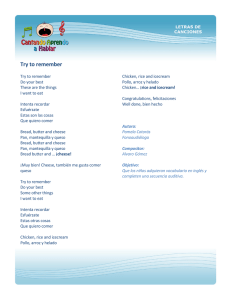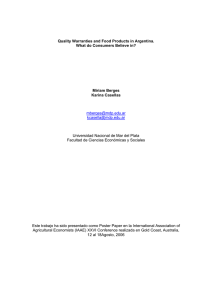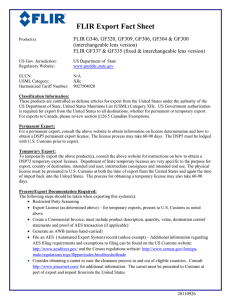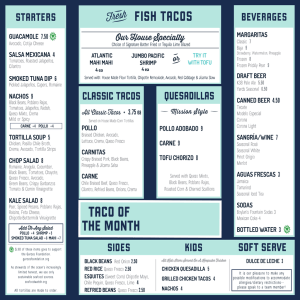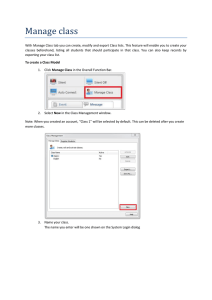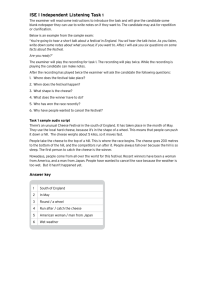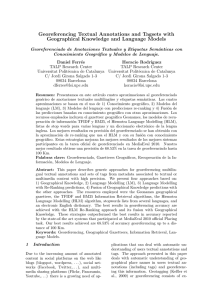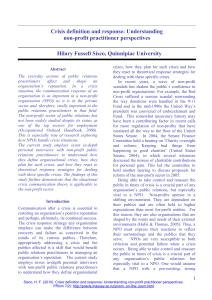FAO Program and Case Studies on Specific Quality Linked to
Anuncio
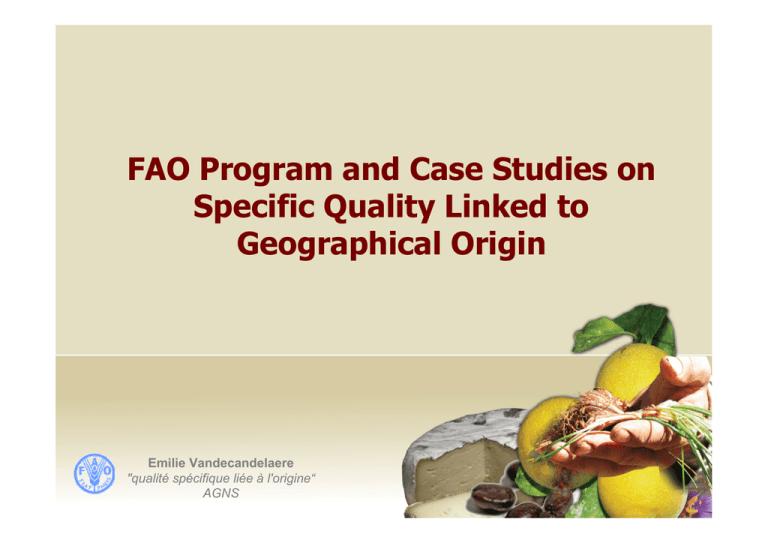
FAO Program and Case Studies on Specific Quality Linked to Geographical Origin Emilie Vandecandelaere "qualité spécifique liée à l'origine“ AGNS Outline 1. Background – – – – Specific Quality Linked to Geographical Origin The program framework Objectives of the study Partnership 2. Methodology of the case studies 3. Overview of the case studies Background Quality linked to Geographical Origin • “Specific quality…”: • as opposed to “generic quality” (guarantees of the mass market, generally mandatory, to protect consumers health and allow market to function well) • characteristics of the products (due to special conditions of production and trade...) that differentiate it through a label in general • voluntary participation of operators • “…Linked to geographical origin”: • specificities due to the production/process area through local resources: natural (“terroir”, landscape etc…), and human (culture, traditions, know how,…) • increasing demands but recent development for developing countries Î Needs for information and support: • Project GCP/INT/022/FRA to inititiate a programme to address Member countries needs • To develop the thematic in connection with the other specific quality schemes within FAO The program framework Main objective: to assist Member Countries and stakeholders in developing develop specific quality linked to geographical origin schemes that are adapted to their economic, social and cultural situation, contributing to rural development through the valorisation and preservation of local products and resources. Means: – Collect information on Member countries experiences: • Regional seminars, expert meeting, networking • case studies with concrete examples on assets and constraints, success or failure factors – Based on this information and analysis, develop supportive tools – Sensitize and inform stakeholders Information collection 2 Regional Seminars: The Mediterranean Casablanca, 8-9 November 07: www.mp-discussion.org/casablanca Latin America Santiago de Chile, 12-13 December 07 http://208.62.62.50/santiago/ Case studies: • To collect information on local experiences for different types of products in various context and geographical areas • To analyse advantages and constraints, success factors of quality process linked to geographical origin • To know the problems and needs at local and institutional levels • To consider first recommendations Partners Develop a network of partnerships is both an aim and a means • Governement representatives: France, the Mediterranean countries, Latin American countries, European Commission… • International and Intergovernmental Organisations: WIPO, ICTSD, IICA, ORIGIN, FIPA… • Research and expert networks: CIHEAM, SinerGI, AGRIDEA, INRA, CIRAD, SIAL, SEEDEV… • National and local institutions and agencies … Methodology of the case studies Studies Framework Partnerships • • • Latin America: IICA Balkans : Agridea, SEEDEV The Mediterranean: INRA, NGO Migration and Development Consultants knowing the local context and product Methods: • • Revue of the available information Stakeholders interviews (producers, processors, public bodies …) and focus groups Analysis and synthesis • Grid of analysis • • Institutional context Geographic zone and specific resources • Product and market • Stakeholders and collective organisation • Analysis of the impacts and synthesis – – – – – – – – – – – – – – – – – – – General context of the geographic area Delimitation of production zone / Processing zone Local resources, material, immaterial, challenges Product qualification process (up grading) Specificity and product differentiation, code of practice (= specifications) Type of recognition of the specificity / level of reputation Markets, current / aimed at (price, volume) Type of actors involved, their roles and objectives Importance of external support (public actors, development/research actors) Structure and coordination Certification and control devices Collective actions Perception by stakeholders Economic impacts Impact on rural development: - economic and social aspects; - Culture, traditions; -Impact on the environment Costs : Certification, Training, research, Change of practices Internal strengths and weaknesses / Opportunities and threats linked to the context Success factors, failure factors Needs and competences necessary for the actors Overview of the cases Latin America Cases Country State Territory Markets Queso Costa Rica de Turrialba Applica tion in process Cantón de Turrialba, (Santa Cruz). Faldas del volcán Turrialba Small area (127Km2, 200 producers, 290tons) National reputation Cacao de Arriba In process (applied in Dec 2006) Zonas cacaoteras del país. Varias Provincias Nacional (220 000has, 95 000tons, 90000 producers, 7% PIB agro) Export, international reputation Ecuador Latin America Cases Country State Territory Markets Queso Cotija México Collective trademark 2005 and process for DO Sierra de Jalmich entre los Estados de Jalisco y Michoacán Medium size area (2400Km2; 200 producers, 400 to 1500kg/year National reputation Cacao de Chuao Venezuela DO 2000 Valle Chuao, Edo. Aragua. Enmarcado en Parque Nal. Acceso por mar Very small area (300 families,24ton, 13has) Export, international reputation Café de Colombia Colombia Zonas cafeteras del país. Varios departamentos. National area (600 000 producers, 550000 tons) Export, international reputation DO 2005 Latin America Cases Country State Territory Markets Maíz gigante de Cuzco Perú DO 2005 Valle de Urubamba. Dpto del Cusco. Valle interandino Medium size (1200km260 000producers, 56000tons) National reputation Chivito de Neuquén (young goat) Argentina In process applied in 2007 Cordillera Norte de las Provincias de Neuquén y la Patagonia Large area (1500families, 25000Km2, 20000animals10%DO) Regional reputation Limón de Pica Chile In process applied in 2007 Oasis de Pica (Iquique) Small area (116 producers, 2000tons, 58Km2) National reputation Balkans Cases Country State Territory Markets Uzice ham Serbia (Zlatibor) (smoked beef meat) PDO in 1995, renewal under new law (2006) Municipality of Catejina (district Zlatibor) Medium size area (current: 647 km2, expected: 9157 km2 Neighboring export (Croatia) Tetovo bean Macedonia PDO in 2006 Sar Planina and Bistra mountains and plain, Polog region, Albania and Kosovo borders Medium size area(920 Km2, 500MT, 5 municipalities) National Reputation Livno cheese (sheep and now with cow milk cheese) Bosnia CoP Cincar Mountain, 2 Herzegovni formulated Polje, Livno and a and approved Glamoc by key stakeholders in January 2008 Medium size area(estimation 1000Km2, 41000 sheeps and 13000 cows) /National reputation, export to Croatia North Africa Cases Country State Territory Markets Safran of Taliouine Morocco Organic, fair trade, beginning of the process Siroua Mountains, Taliouine and Tazenakht Medium size area (500+100has, 1370families+?, approx:600kg) National reputation, export? Sheep cheese of Beja (Rigouta and Sicilian type) Tunisia Diagnostic Montagne, 2 gouvernorats de Bizerte et de Béja, Nord Tunisie. small (100 tonnes) Local reputation Stage of Reputation recognition PRODUCT Stage of the qualification-recognition process Up-grading / Application in process Queso Cotija Queso Turrialba Cacao de Chuao Café de Colombia Cacao de Arriba Maíz Blanco Cusco Chivito de Neuquén Limón de Pica Safran Taliouine Beja cheese Uzice Ham Tetovo beans Livno cheese GI DO registered GI DO being managed GI DO internacionally recognised Conclusion • Early stages of development: – what about the managing process? – very first results on impacts • Diversity of products: – lots of non processed one: role of race and variety in the differentiation – for export, links to consumers? • Regional particularities but lots of common points... Note: first analysis (operational view, not research as such)... and for discussion! THANK YOU
